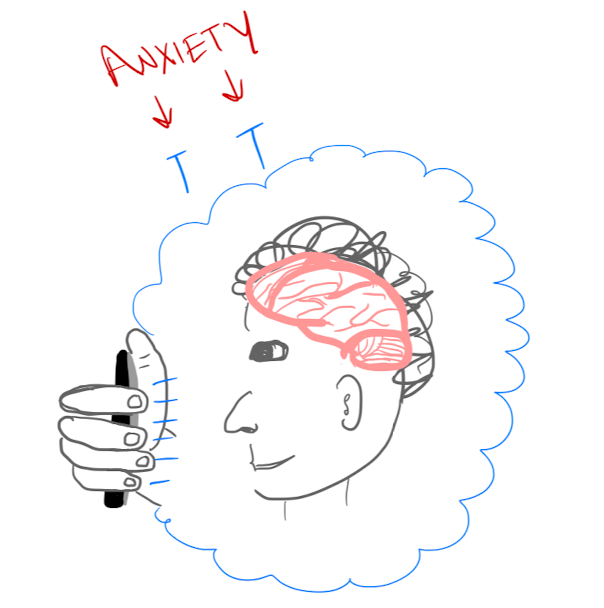Combating Anxiety & Overstimulation

It wasn’t until after finishing my first semester when I realized that I had been overstimulating myself. I rarely took a day off and I was mostly managing my stress with distractions like Netflix, podcasts, or YouTube. As a result, it took me almost the entire first week of winter break to “land the plane” and bring my resting state back to baseline again.
It was during winter break when I serendipitously discovered Cal Newport. He has authored several books (including Deep Work) and has a podcast where he discusses how to live a more fulfilling and productive life. Through his work, I learned about the 30 Day Digital Declutter, a plan he created that helps anyone reduce their screen time and refocus their energy into activities that are more meaningful.
This is exactly what I needed.
The main idea is simple: purge all optional digital apps for 30 days and, instead, use that time for meaningful activities. You can return to using the purged apps afterwards, however, ideally, with a new awareness of how it helps you live a more fulfilling life. Chances are you’ll realize that you don’t need many of those apps and you won’t want to spend nearly as much time using them as you did before.
Note: The word “optional” above is important because Newport understands that in today’s age many of us require technology in order to work. However, the goal is to trim the fat and keep your digital presence as lean as possible. For example, I need Facebook in order to access a group for school where I can download study material. However, I don’t want to get stuck scrolling through Facebook any time I open the app. Setting a 15 minute limit for the day allows me enough time to get the study materials I need and also prevents me from endless scrolling.
Here are the Digital Declutter rules that I created for myself:
- Generally, make a conscious effort to pick up a book instead of my phone, especially at night (i.e. read rather than watch Netflix).
- No phone at all during short study breaks; I can only check it during long breaks and after 5 pm, at the end of my work day.
- Each week I am limited to 3 podcasts total: Cal Newport’s two weekly episodes, plus one other long-form podcast of my choice (3-5 hours total).
- iPhone Settings: Do Not Disturb is on from 7 am to 5 pm, 15 minute daily limit set for all social media apps, and remove all problematic apps from my home screen so I’m not tempted to open them.
- If limits have been reached, then in my spare time I must perform a meaningful activity (i.e. read, write, exercise, etc.) or do nothing.
By the end of 30 days, I read five books and started two others, and I published four blog posts, doubling my monthly goal. I also had extra time to spend time with my wife, call my family, and do other chores that otherwise pile up throughout the semester.
It is amazing to me how much extra time that I have for myself now after simply limiting my screen time. However, perhaps the most interesting thing about this experience, to me, is the vacuum that appears when screen time is no longer an option. Even after all the reading, writing, and family phone calls, I still have spare time that I am not sure what to do with. This leads me to the most difficult aspect of the Digital Declutter: having nothing to do.
The hardest rule for me to follow is #5:
If limits have been reached, then in my spare time I must perform a meaningful activity or do nothing.
Doing nothing is actually quite difficult, as it can be painfully boring. Sitting around with nothing to do is when I have the most intense urges to grab my phone, even when I know I shouldn’t. Whenever I break Rule #5 and pick up my phone, I notice that I am purposelessly scrolling through screens and opening and closing apps. It took me a while to realize that I was using my phone as a maladaptive coping mechanism to distract from underlying anxieties.

Although it’s not particularly healthy, I admittedly have a tendency to bottle things up until I snap, rather than address and resolve my emotions when they begin to surface. Anxiety is uncomfortable. Naturally, to avoid the discomfort of facing difficult emotions, I subconsciously search for the easiest way to dull the pain — my phone.
By cutting out screen time, I am intentionally predisposing myself to feeling anxious and uncomfortable more often by systematically removing the primary coping mechanism that serves to protect my ego from difficult emotions. The inevitable result is an increase in emotional sensitivity, since there is no longer a buffer to dull my experiences.
Now, why would I do this? Why should I integrate these habits into my life if they’re going to make me feel so uncomfortable?
I like to compare it to exercising. Straining to lift weights or going for a run is uncomfortable. However, my mind and body feel better after I channel the energy into strenuous exercise. Similarly, the solution to anxiety is to be present with it — “let it in” and give the emotions space to be. It doesn’t usually feel good to let in the emotions that are causing the anxiety, but the long-term relief I feel after addressing the underlying problem makes the initial discomfort worth it.
Since starting medical school, I feel that my baseline stress level has increased significantly, and thus, I’m more emotionally charged. There are many things that must be done and my success is based on my performance. Managing my anxiety and emotions is critical to staying healthy and fit in order to accomplish everything I need to in order to become a great physician. I don’t think that I necessarily need to completely stop using social media and other means for distraction and filling time. However, I think there is tremendous value in decreasing usage to some extent and replacing it with more meaningful activity so that I can be the best version of myself.




Comments ()